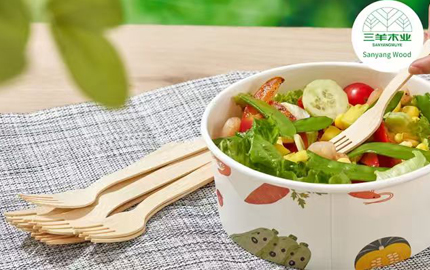

Traditional disposable plastic tableware is one of the very main pollution sources for our environment. Its problems mainly reflect in:
They need several hundred years for nature degradation. After being thrown away, either they pile up in the landfill for a long time, or they enter the natural environment.
Plastic products that flow into the ocean will break down into microplastics, which are eaten by mistake by marine life, and through the food chain, finally enter the human body. This threatens the whole ecosystem and human health.
Cause resource waste and carbon emissions: The production process of plastic will consume a lot of non-renewable resources, and produce significant greenhouse gas emissions, making carbon emissions more serious.
Under this background, custom wooden utensils and custom bamboo utensils are gradually becoming the sustainable replacement for disposable tableware, which echoes with the rise of eco-friendly event trends. They perfectly meet the comprehensive needs of the food and beverage industry for environmental protection, beautiful appearance, and practical function.
Today's consumers and event participants are no longer the passive onlookers of environmental protection. They have increasingly strong sustainable development awareness, becoming active supervisors and advocates.
As awareness improves, consumer preference is also shifting from vague "environmental protection" concepts to solutions with clear scientific basis.
For example:
The demand for products with reliable certifications (like BPI, FSC, FDA certification) is increasing very fast.
Combination of function and aesthetics: For example, having higher requirements for the aesthetics and experience of disposable tableware.
Nowadays, some large-scale, influential events are needed to set an example for the whole industry and verify the feasibility of new solutions. After these high-profile events successfully implement some environmental innovation, they provide replicable templates and business cases for small and medium-sized events, accelerating the popularization of new technologies and new standards throughout the industry.
From the environmental perspective:
Made from renewable wood & bamboo, these utensils reduce environmental impact and naturally decompose after use, minimizing landfill waste. Unlike traditional plastic utensils, wooden & bamboo utensils are biodegradable and naturally decompose after use, reducing environmental pollution.
Design and aesthetic appeal:
Wooden and bamboo tableware has the most natural, simple elegance. These utensils play a big role in creating high-end or eco-chic event atmospheres, especially in today's food industry which increasingly pursues green, sustainable, and environmental protection concepts. Natural aesthetic: Adds a rustic charm to presentations.
Practicality:
Durable and fully functional, suitable for various foods (lightweight but sturdy). Suitable for many different occasions like weddings, corporate events, and outdoor gatherings.
The following are four common types of events where wooden and bamboo tableware are well-suited categories:
Weddings and Receptions: The natural texture and feel of wooden and bamboo tableware can perfectly blend into the scene, strengthening the "return to nature" romantic theme.
Outdoor Festivals and Picnics: Outdoor music festivals, food festivals are the "hardest hit areas" for plastic pollution. Mandating or encouraging the use of wood/bamboo utensils can significantly reduce stubborn plastic waste from the source.
Corporate Events Aiming for Sustainable Development: An effective way to make a company's sustainability report commitments "tangible".
Eco-friendly Birthday Parties and Private Gatherings: Don't need to worry about washing lots of dishes and plates, while also avoiding the use of plastic tableware that brings strong guilt. Wooden and bamboo tableware provide a perfect compromise solution.

Wooden Utensils: Feel slightly more lightweight, surface is very smooth, suitable for common dinners or environmental theme events.
Bamboo Utensils: Material is slightly harder, suitable for outdoor dining (especially the use of bamboo skewers) and some large corporate characteristic environmental events.
Check core qualifications and certifications: This is the foundation for ensuring product safety and environmental protection. Must ask suppliers to provide relevant product certifications.
Evaluate the product and materials themselves.
Examine the supplier's comprehensive capabilities: Such as quality management, whether the supply chain is stable, and whether they have diversified customization services.
Henan Sanyang Wood Industry Co., Ltd., established in 1993, has become a global leader in the production of food-grade bamboo and wooden utensils. We cover the entire production chain from log to final finished products, dedicated to the independent development of production lines and equipment, driving the digital transformation and technological innovation of the industry. We are committed to green and sustainable development, considering it our long-term mission.
Zero Waste Event Initiatives: The goal is to ensure that at least 90% of the waste generated by the event does not go to landfill or incineration.
Recyclable/Reusable Event Supplies, such as plates and other tableware. Wooden/bamboo utensils and other compostable material tableware become important transitional or situational solutions. Although they are not "reusable," compared to plastic, they are more environmentally friendly.
How Wooden and Bamboo Utensils Integrate into the Increasingly Popular "Green" Lifestyle: They are not just functional tools, but also carriers of values and aesthetics.
Wooden and bamboo tableware are highly favored in eco-friendly event planning because they accurately respond to the modern event planning's pursuit of sustainability, aesthetic experience, and environmental responsibility. If you are looking for reliable bamboo and wooden tableware for your event, Sanyang Wood is an option worth paying attention to. According to market reports, it is one of the main enterprises in the disposable wooden tableware industry. Visit Sanyang Wood at: https://www.sanyangwood.com/